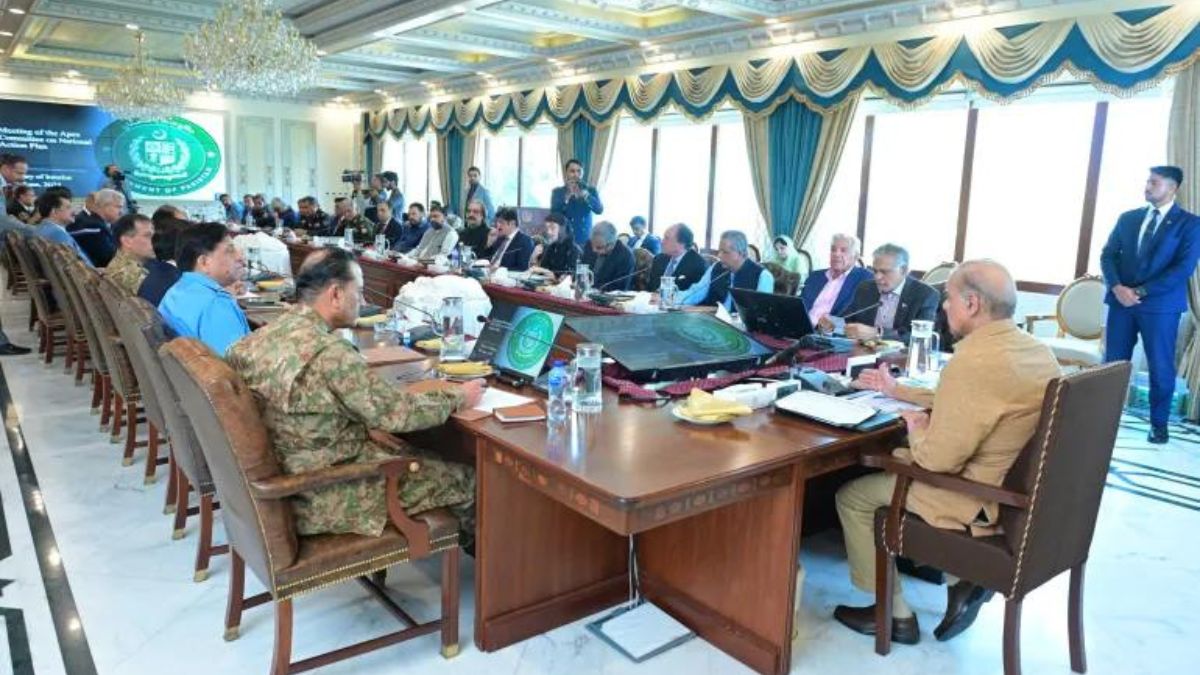Pakistan’s top leadership has approved a new military operation named Azm-e-Istehkam, meaning ‘Resolve for Stability’ in Urdu, aimed at quelling a surge in violence and terrorism.
This initiative follows Pakistan Prime Minister Shehbaz Sharif’s review of the country’s counterterrorism operations, particularly focusing on the National Action Plan adopted after the December 2014 Peshawar Army Public School attack, which resulted in over 140 deaths, mostly students, claimed by the Pakistan Taliban (TTP).
What does the military operation aim to do?
The operation seeks to address domestic security threats and armed fighters crossing over from Afghanistan amidst rising tensions between Islamabad and Kabul. Sharif’s office announced plans to “intensify” efforts against “terrorists” through regional cooperation.
The campaign will also include socioeconomic measures to address the population’s concerns and create an environment discouraging extremist tendencies. This comprehensive strategy integrates military, legislative, and diplomatic efforts to combat terrorism and extremism.
“The campaign will be complemented by socioeconomic measures aimed at addressing genuine concerns of the people and creating an environment that discourages extremist tendencies,” stated a release from the prime minister’s office (PMO).
The military campaign will also ensure legal support from all law enforcement agencies, addressing voids that hinder prosecution and award exemplary punishments to terrorists.
“The renewed and full-blown kinetic efforts of the armed forces will be augmented by full support from all Law Enforcement Agencies, empowered by effective legislation to address legal voids that hinder effective prosecution of terrorism-related cases and award of exemplary punishments to them,” according to the Pakistan PMO statement.
Impact Shorts
More ShortsThe operation also emphasises socioeconomic measures to address the population’s genuine concerns and discourage extremist tendencies. The information space will be leveraged to promote a unified national narrative supporting the campaign.
How is Afghanistan involved?
The announcement comes amid a dramatic increase in violent incidents over the past 18 months, mostly claimed by the TTP. The TTP ended a ceasefire in November 2022, and Pakistan has accused Kabul of harbouring TTP members, a charge the Taliban government denies. Analysts predict potential escalations if Pakistan’s operation extends into Afghanistan.
Also Read | Balochistan on boil: Why situation is turning bleak for Pakistan and its army
“In March, Pakistan even conducted cross-border strikes in Afghanistan against suspected Pakistani Taliban hideouts, which were publicly confirmed by the foreign office,” Ihsanullah Tipu, an Islamabad-based security analyst told Al Jazeera. Tipu added that Islamabad views kinetic military actions as the most effective approach to counter armed violence.
Is Pakistan following China’s command?
The operation also addresses concerns from China, a key ally and investor in Pakistan’s infrastructure through the $62 billion China-Pakistan Economic Corridor (CPEC). The security of Chinese nationals and projects has become critical following multiple attacks, including the death of five Chinese engineers in March 2024.
“We need to improve security and the business environment. In Pakistan’s case, the primary factor shaking the confidence of Chinese investors is the security situation,” stated Liu Jianchao, a senior Chinese official, during his visit to Pakistan.
However, Asfandyar Mir, a South Asia expert at the United States Institute of Peace (USIP), suggests that while Chinese concerns likely influenced Pakistani leadership, the timing of the new operation may be driven more by domestic politics and economic considerations.
What are the domestic factors?
“Last year, Pakistan faced a near-default and underwent a contentious election amid significant domestic political turmoil. A large-scale military campaign was not feasible under those circumstances,” Mir noted.
“With the election done and a government in place, and the economic situation stabilising, at least relatively, Pakistani leadership probably feels confident that it has sufficient domestic political space and a modicum of economic stability now to pursue a vigourous campaign to address the deteriorating security situation,” he told Al Jazeera.
Pakistan faced near-default in the previous year and political turmoil during elections, making a large-scale military campaign unfeasible.
With relative economic stability and a new government, Pakistani leadership feels confident to pursue this campaign.
Can the military operation succeed?
Despite the robust plans, there are concerns about the operation’s potential success. Abdul Sayed, a researcher on armed groups, pointed out that armed groups target security forces to undermine government interests while maintaining public support. Lack of public support in violence-affected provinces could hinder the operation’s effectiveness.
“The Pakistani Taliban do not have permanent bases in Pakistan; instead, they operate from makeshift ones, frequently changing locations. If Pakistan conducts cross-border operations in Afghanistan, it could escalate tensions between the two countries,” said Tipu.
Also Read: Pakistan arrests Ahmadis saying Eid rituals ‘violation of constitution’. Why it’s not
With a blend of military action, legislative support, and socioeconomic initiatives, the operation aims to restore stability and security in the country while addressing regional and international concerns.
With inputs from agencies
)